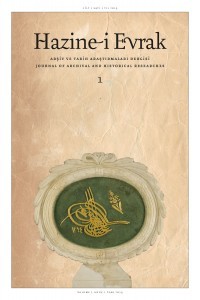
Hazine-i Evrak Arşiv ve Tarih Araştırmaları Dergisi
Yazarlar: ["Mustafa ÖKSÜZ"]
Konular:-
Anahtar Kelimeler:Eyyûbîler,Osmanlılar,Kudüs,Hakkârililer,Vakıf
Özet: Historical sources show us that during the conquest of Jerusalem on October 2, 1187, there were some people from Hakkari in the entourage of the victorious commander Salahuddin Al-Ayyubi. While some of them were members of the ulama class, the rest mostly were warriors. Those people, who were with Sultan Salahuddin, took on very important duties during his reign in Jerusalem, and in return for their services they were allowed to establish waqfs or charitable foundations. The emergence of charitable foundations was not only limited to the period of the aforementioned sultan but also seen in the periods of other rulers, which demonstrates the process of charitable foundation as a long-term phenomenon. Those who settled in the region after the conquest gave birth to new generations and these people, who found life in a new environment far from where their ancestors came from, were mentioned in the sources with the nickname “al-Hakkârî” or from Hakkari. When the Ayyubid State withdrew from the stage of history, these people started to have close contact with the Mamluk sultans and some of them took part in the close working team of the new administrators and continued to establish new foundations. Based on the Ottoman archival documents, this article examines the foundations established by the people of Hakkari during the Ayyubid and Mamluk rules. The foundation books and court records, especially the detailed cadastral registers, were used through an analytical filter to provide a sound historical dimension. The article aims to contribute to the heritage of today's Jerusalem by putting these institutions into a historical context.